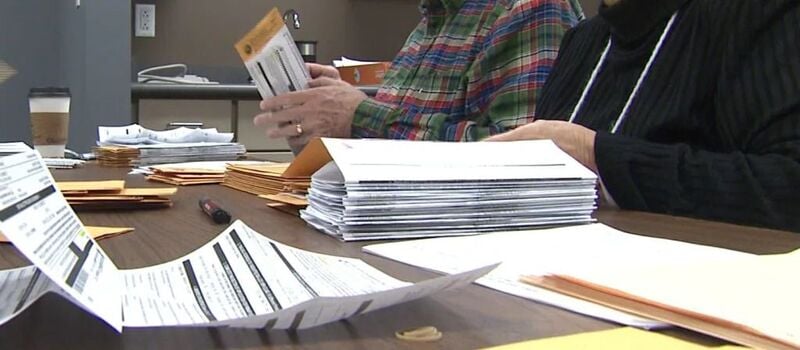Voter fraud is very rare, but the state still takes it very seriously, officials say.
By Howard Hardee and Peter Cameron, THE BADGER PROJECT
Even though voter fraud is rare, in Wisconsin and nationally, many checks exist to prevent and catch it here, whether it be accidental or intentional.
In the 2020 election, approximately 0.003% of the nearly 3.3 million ballots cast in Wisconsin were submitted illegally by felons not yet eligible to vote because they hadn’t completed their full sentences, according to the Associated Press. That’s the most common type of prohibited voting in Wisconsin, experts say. That number is also about the same amount of illegal votes cast by felons in the 2016 election, the AP noted. Former President Donald Trump won that election by about 23,000 votes.
In the wake of the 2020 election in Wisconsin, voter fraud charges have been filed against at least 24 people in 12 different counties, according to the AP. Of those, 16 were allegedly felons not yet eligible to vote. President Joe Biden won the state in the 2020 election by about 21,000 votes.
Because Wisconsin runs its elections at the municipal level, rather than county or state, it has one of the most decentralized election administration systems in the nation, according to the Wisconsin Elections Commission. The state has about 1,850 municipalities.
The Badger Project talked to Wisconsin Elections Commission spokesman Riley Vetterkind, as well as Barry Burden, a political science professor and director of the Elections Research Center at UW-Madison, about the checks in place to deter and catch voter fraud in the state.
1. All voters are required to register
Residents may register to vote online at www.MyVote.wi.gov, by mail, at their municipal clerk’s office, or at their polling place on Election Day. Only voters with a valid Wisconsin driver's license or state ID card can register online. To prove residency when registering by mail, at their municipal clerk’s office, or at the polls on Election Day, voters must bring an official document, like a bank statement or a state ID, that has their current address.
2. Photo ID is required to vote by mail, and absentee ballots require a witness
Voters who request an absentee ballot must be registered to vote. If you request a ballot online at www.MyVote.wi.gov, most voters will need to upload a copy of their photo ID if they haven’t done it previously, Vetterkind said.
Wisconsin also requires the filling out of absentee ballots be witnessed and signed by another person.
“It is not clear that this requirement is effective in inhibiting absentee ballot fraud, but it is an extra step that must be taken to cast an absentee ballot,” Burden said.
The state has online tools that let voters and election officials track ballots as they “wind their way through the system,” Burden said. “These tools are quite helpful for providing transparency and as a check on potential crimes such as theft of absentee ballots from mailboxes.”
3. Felons can’t legally vote until completing their entire sentence… Probation too
Safeguards are in place to prevent the most common form of prohibited voting — when a resident who is ineligible to vote due to a felony conviction attempts to cast a ballot. The Wisconsin Department of Corrections is required by law to provide the commission with an updated list of people convicted of felonies on a continuous basis, as well as those who have completed their entire sentence and are eligible to vote again, Vetterkind said.
If a person who hasn’t completed their full felony sentence tried to register to vote on Election Day, they would most likely get flagged by an election worker. It’s not a foolproof system; sometimes individuals slip through, Vetterkind said. But those cases are usually discovered during a post-election audit which is mandated by state law.
This type of illegal voting usually isn't intentional, Burden said.

“People who are on parole or probation from felony convictions are often unaware of election laws and assume that they are able to vote once their incarceration ends,” he said. “Their attempts to vote can sometimes be labeled as purposeful vote fraud, but they are typically misunderstandings of the law.”
4. Dead people can’t vote
The Wisconsin Election Commission receives regular updates from the Vital Records office in the state’s Department of Health and Human Services, which issues death certificates, Vetterkind said. Deceased residents are removed from the voter list.
5. Potential vote fraud is investigated
If voter fraud is suspected, municipal clerks will alert their county district attorney’s office for investigation. The Wisconsin Election Commission reports such cases to the Wisconsin State Legislature and posts them online for public viewing. The commission also checks to see if felons still serving their sentence have voted, in which case they would refer that case to law enforcement.
6. Voting equipment is double-checked
After an election, officials assess the performance of electronic voting equipment by auditing a random sampling of ballots. Compared to 2020, the Wisconsin Elections Commission will double the number of reporting units audited in 2022, from 5% to 10%, Vetterkind said. Reporting units consist of one or several wards.
During this process, election workers hand-count paper ballots. The total is compared to the election night voting system results. Audit materials are submitted to the Wisconsin Elections Commission for review, and any discrepancies are investigated, Vetterkind noted.
7. People can’t vote more than once
Wisconsin is part of a 33-state organization known as the Electronic Registration Information Center that provides reports on potential duplicate registration records in different states and flags registrants who might have died or moved, Vetterkind said.
The organization also detects when somebody tries to vote in more than one state.
“The system has become a source of controversy because it is not perfectly reliable in every case, but it is nonetheless a tool that allows the state to look into records that may need to be updated or purged,” Burden said. “Simply notifying voters that their records have been flagged can be a helpful alert in case another person was attempting voter registration fraud.”
8. Anyone can report suspected vote fraud
If a person suspects they’ve witnessed a form of voter fraud, they can report it to local law enforcement or they can file a sworn complaint with the Wisconsin Election Commission, Vetterkind said. The public’s eyes serve as another layer of protection for the integrity of the election, he added.
The Badger Project is a nonpartisan, citizen-supported journalism nonprofit in Wisconsin.
This article first appeared on The Badger Project and is republished here under a Creative Commons license.



Add new comment